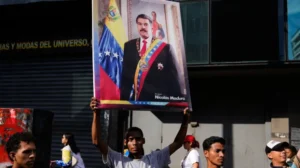Africa’s richest industrialist, Aliko Dangote, has urged the federal government to urgently pass into law the proposed ‘Nigeria First’ Policy, stressing that it is vital to reposition the nation’s manufacturing sector, boost GDP, and generate millions of jobs.
Speaking at the 5th Adeola Odutola Lecture organised by the Manufacturers Association of Nigeria (MAN) in Lagos, themed “Nigeria First: Prioritising Made-in-Nigeria”, Dangote said the country’s industrial future is at risk unless decisive steps are taken to prioritise local production over imports.
Manufacturing in Crisis
Dangote lamented that manufacturing currently accounts for less than 10% of Nigeria’s GDP, a figure that has remained stagnant for more than a decade. He attributed this to weak industrial policies, infrastructure gaps, and Nigeria’s long-standing dependence on imports.
He described the ‘Nigeria First’ Policy as a forward-thinking framework designed to strengthen domestic industries, build economic resilience, and make Nigeria more competitive globally.
“If implemented effectively, it can boost GDP, reduce import dependence, and create jobs across the country,” Dangote said.
Policy Recommendations
Dangote outlined key priorities he believes should guide the ‘Nigeria First’ agenda, including:
-
Legislating the policy into law with enforceable compliance measures.
-
Ensuring policy stability to build investor confidence and avoid reversals.
-
Establishing a National Supplier Registry to promote transparency in government procurement.
-
Launching a “Buy Made in Nigeria” campaign to encourage local consumption.
-
Incentivising backward integration for companies sourcing raw materials locally.
-
Improving infrastructure and access to energy, and expanding financing opportunities for manufacturers.
-
Leveraging AfCFTA (African Continental Free Trade Area) to expand Nigeria’s export base and regional influence.
Dangote also referenced the collapse of Nigeria’s once-thriving textile industry, which used to employ more than 500,000 people across 180 mills, as a cautionary example of policy neglect and uncontrolled importation.
“The Nigeria First Policy must go beyond politics and become a national development strategy,” he insisted.
Government and MAN React
In her remarks, Minister of Industry, Trade and Investment, Dr. Jumoke Oduwole, echoed Dangote’s call for industrial revival, urging manufacturers to take full advantage of AfCFTA to expand their reach across Africa.
“We are negotiating access to continental markets to help your products scale across Africa,” she said, aligning the initiative with President Bola Tinubu’s industrial growth agenda.
MAN President, Otunba Francis Meshioye, described the “Nigeria First” policy as more than just an economic goal — but a matter of national survival.
“For decades, we have depended on imports while neglecting our industries. This model has failed to deliver inclusive growth or competitiveness,” Meshioye stated.
He warned that continued import dependence amounts to subsidizing foreign economies at the expense of Nigerian factories, which are struggling with low capacity utilization and underperformance.
“If we fail to support local manufacturers intentionally, we will keep exporting jobs and importing poverty,” he added.
The Bigger Picture
Speakers at the event agreed that the “Nigeria First” policy represents a defining moment for the country’s industrial future — one that could determine whether Nigeria remains an import-driven economy or evolves into a self-sustaining manufacturing powerhouse.








